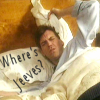Well, what can I say. It’s the kind of movie that triggers lots of superficial conflict and cultural anxieties for me. When I like it, I know I’m slipping down that slope to hegemonic sell-out land. Where it annoys me, I know I’ve made the argument a million times before (to myself and anyone who will listen, take my courses, or read my blog). And I can’t change the world to be more analytical except by one willing, sympathetic soul at a time.
So. Enchanted: This Disneyfied almost-Princess finds herself tossed into NYC 2007 and must survive til she can be rescued by her Prince and return home. She’s entirely ill-equipped, of course, to navigate our world. And so there’s superficial pseudo-post-feminist critique there momentarily. The classic western fairytales all involve ill-equipped lovely maidens being rescued. I prefer Sondheim.
That our heroine manages to get NYC pigeons, rats, and roaches to clean her rescuer's apartment is fascinating, especially as what passes, then, for “clean” is roach/rat/pigeon-cleaned clean. Which I enjoy. All animals are new “friends” to our heroine, and I do love her holding up and singing to a CGI roach at one point.
At the same time, I’m groaning from my absolute knowledge that this film will end “happily ever after,” and the odds are that the soft-spoken NYC hero won’t end up with his careerist “professional” (a.k.a. pseudo-post-feminist) girlfriend.
Along the way, I’m enjoying the song and dance numbers and the absolutely irresistible message that we all need a little magic in our lives. Heaven knows, these sorts of films beg us to acknowledge how dull and painful our lives are. And sometimes in some ways they certainly are. But then they offer us a few minutes in the dark of a fantasy we cannot possibly achieve as our “reward” for our acknowledgment. I say the payoff is woefully inadequate and just leads to further depression or unrealistic expectations of what "happily ever after" is truly about: a lot of luck and a lot of relationship work.
(I’m also NOT enjoying the little girl in the film. Lousy actress and annoying to watch. What producer's kid is this that she got the part?)
Anyhow. Back to the fantasy. I predicted at the beginning that the princess would become the magical catalyst for the main fella, helping him and his girlfriend to live happily ever after. I kept saying, “Well, at least it won’t be him ending up with her! She needs to go back to fairyland with her incredible childlike naïveté that men with midlife crises often want and divorce their wives for then go, ‘Oops, I seem to be married to someone without maturity, self-insight, or adult goals.’ Guess I'll cheat on her now."
Halfway through the flick, though, I look at my son and say, “Yep, they’re going to end up together” as I push away my over-salted popcorn. I also predict at this point that the workaholic girlfriend (who really we don’t see developed at all as a character, resting so fully as she does on stereotypes of “Today’s Woman” that she doesn’t need development) will end up with the clueless Prince, which she does. That she has to go all the way to Disney fairytaleland to achieve happiness is really sad and, I think, a message the writers feel oh-so proud of. Aren't we clever? We acknowledge that careerist women are as unhappy as men! That the writers believe that this woman would truly want to live the rest of her life with a braindead prince, of course, tells me they’re either all men in midlife crisis wanting to excuse their own sexism by pretending women are just the same as men, or they're women who’ve bought into this mythology, too.
But yeah, ok, corporate life does suck mightily, and I understand why the girlfriend wants out. It’s just that presenting these fantasy extremes just doesn’t help us out, either as real solution or as truly pleasant diversion.
The price we pay for each moment of laughter in a film like this does trouble me.
I will say this, though: I noticed the wrinkles around the super-skinny lead actress’s eyes as she played her bimbo-voiced, wide-eyed wonderfantasygirl and fashion designer. And I thought: Susan Sarandon looks better. And I’d rather be the Wicked Queen than the Bimbo Princess, every time. Am sure Sarandon agrees.
Tell me: Are there truly no new stories to tell?

 Then, of course, was the show itself. The sets were an ornate and gorgeous spectacle. The giant dragon with his red lighted eyes and movement at crucial powerful moments was amazing, though did not seem to have any relationship to anything going on in the show. I don't think Oz was mentioned as actually having dragons or mythical creatures, really. Just talking, humanlike animals that were being increasingly oppressed and silenced. Hmm.
Then, of course, was the show itself. The sets were an ornate and gorgeous spectacle. The giant dragon with his red lighted eyes and movement at crucial powerful moments was amazing, though did not seem to have any relationship to anything going on in the show. I don't think Oz was mentioned as actually having dragons or mythical creatures, really. Just talking, humanlike animals that were being increasingly oppressed and silenced. Hmm. 







 I won't look like her (ha!) but she played it very strong, low-voiced, and sultry rather than flighty. It should be an interesting ride!
I won't look like her (ha!) but she played it very strong, low-voiced, and sultry rather than flighty. It should be an interesting ride!
